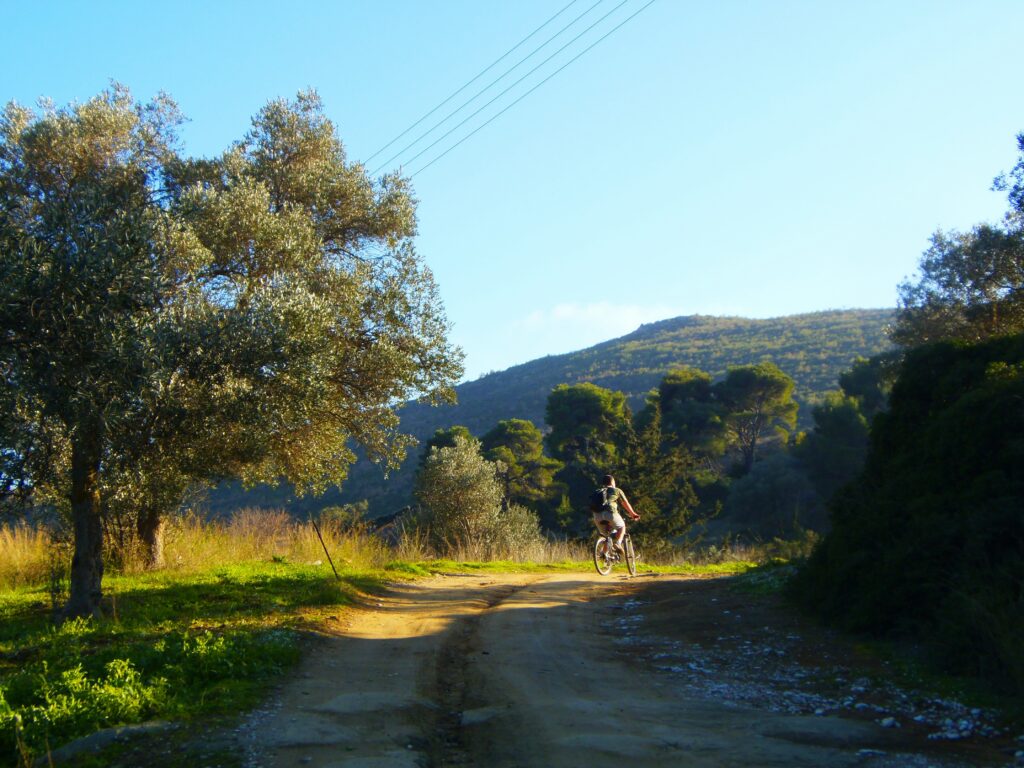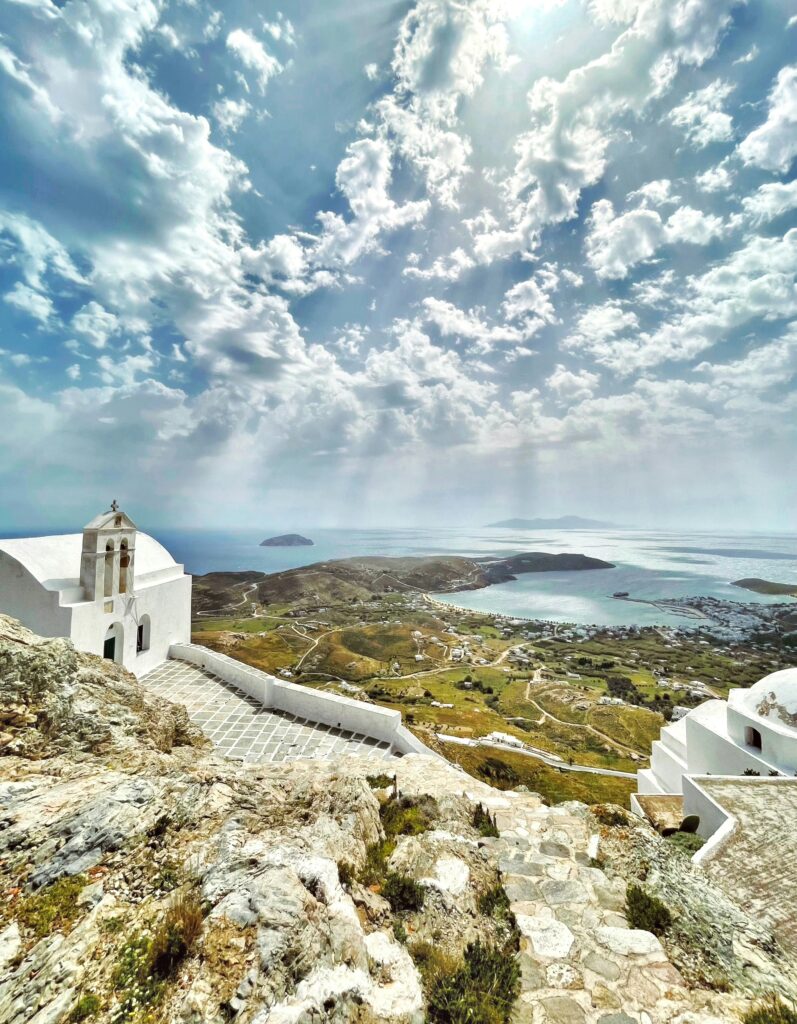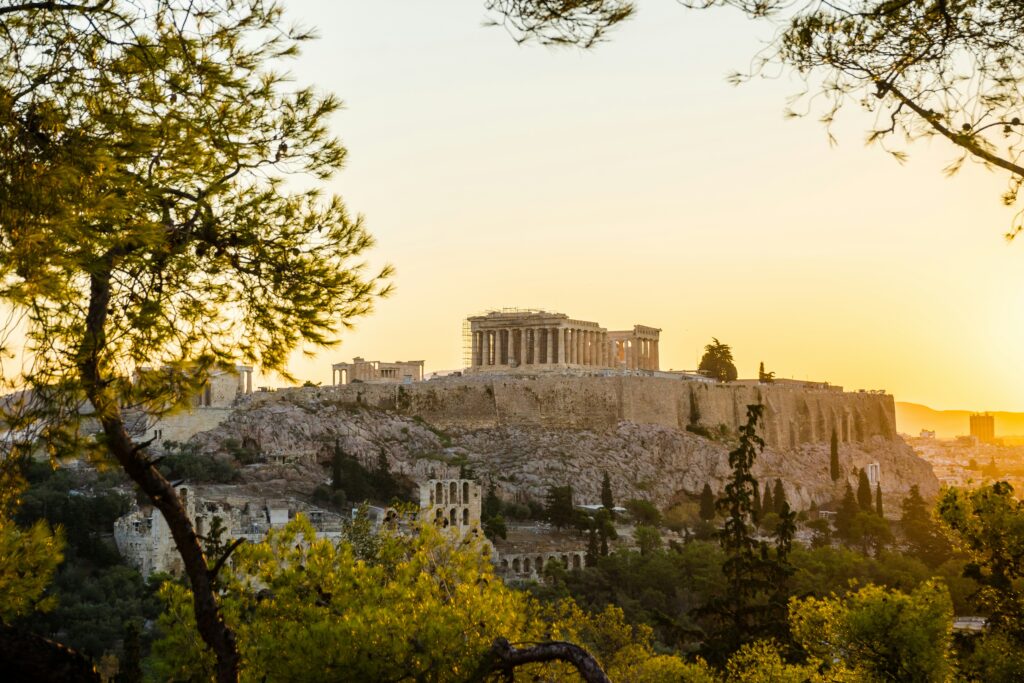There’s an inherent alignment between yoga philosophy and ecological consciousness—both invite us to recognize our interconnection with all life, to consume mindfully, to tread lightly, and to honor the earth that sustains us. Greece, with its ancient olive groves, crystalline seas threatened by pollution, and landscapes shaped by thousands of years of human habitation, provides powerful ground for exploring this relationship. Eco yoga retreats here aren’t just about reducing environmental impact; they’re about recovering an older understanding of how humans can live in reciprocity with land and sea rather than simply extracting from them.

What makes eco retreats in Greece distinctive is that sustainability here often looks less like cutting-edge green technology and more like recovering traditional practices. Solar-heated water, natural ventilation instead of air conditioning, locally sourced food, building with stone and wood—these aren’t innovations but returns to how Greeks lived for centuries before cheap energy made waste possible. The olive trees that provide shade, the cisterns that capture rainwater, the thick stone walls that moderate temperature—this is ecological wisdom embedded in architecture and agriculture, proven over millennia.
Eco yoga retreats in Greece range from off-grid properties powered entirely by sun and wind to more conventional centers that incorporate sustainable practices within contemporary comfort frameworks. What they share is intention—a commitment to demonstrating that wellness tourism doesn’t have to degrade the environments that make it possible, and a recognition that our personal healing and the health of the ecosystems we inhabit are inseparable.
What Makes a Retreat “Eco” in the Greek Context
Defining ecological sustainability in Greece requires understanding the specific environmental challenges and opportunities the country faces. Water scarcity on many islands makes water conservation essential. Waste management infrastructure is limited, making reduction and composting critical. Dependence on imported fossil fuels for energy creates both environmental and economic arguments for renewable power. And the Mediterranean ecosystem—fragile, biodiverse, increasingly threatened by climate change—demands careful stewardship.

Eco retreats in Greece typically incorporate several key practices. Energy sourcing emphasizes solar (Greece’s abundant sunshine makes this obvious), sometimes supplemented by wind on particularly breezy islands. Water management includes rainwater capture, greywater recycling for gardens, and sometimes innovative systems like composting toilets that eliminate sewage entirely. Building and renovation use local, natural materials—stone, wood, lime plaster—that require less embodied energy than modern materials and provide better thermal performance.
Food sourcing prioritizes organic produce from local growers, often featuring permaculture gardens on-site where guests see and sometimes participate in growing food. Animal products, when served, come from small-scale local farms with humane practices. Fish is sourced from sustainable fisheries or local fishermen using traditional methods rather than industrial operations. The Mediterranean diet, emphasizing plants, legumes, olive oil, and small amounts of animal products, aligns naturally with both health and environmental sustainability.

Waste reduction takes multiple forms—composting organic matter, eliminating single-use plastics, providing filtered water in reusable bottles rather than buying cases of bottled water, and partnering with recycling programs where they exist (still limited in many rural Greek areas, requiring retreat centers to transport materials to recycling facilities). Chemical cleaning products are replaced with natural alternatives—vinegar, baking soda, essential oils—that don’t contaminate local water supplies.
Equally important but less tangible: eco retreats in Greece typically emphasize education and local economic benefit. Guests learn about Mediterranean ecology, traditional sustainable practices, and threats facing the region. Retreat operations support local communities through employment, purchasing, and cultural exchange rather than extracting value through international ownership and supply chains. This economic sustainability—ensuring that tourism benefits rather than exploits local people—is as crucial as environmental measures.
Types of Eco Retreats: From Rustic to Refined
Greece’s eco yoga retreats exist on a spectrum from deeply rustic to surprisingly sophisticated, each offering different trade-offs between ecological purity and conventional comfort.
Off-Grid Pioneers: At one end are properties completely disconnected from public utilities—no grid electricity, no municipal water, no connection to sewage systems. These retreats, often in remote locations on islands or mainland mountains, operate entirely on renewable energy (solar panels, sometimes small wind turbines), capture all water from rain and springs, and manage waste through composting and careful recycling. Accommodations might include yurts, simple cabins, or renovated stone buildings with minimal electricity. Lighting comes from candles and solar lamps, refrigeration is limited, and you might shower with sun-heated water in outdoor facilities.
This level of simplicity isn’t for everyone—it requires flexibility regarding comfort, acceptance of variable power availability (cloudy days mean less electricity), and tolerance for composting toilets and outdoor showers. But for those who embrace it, off-grid retreat provides visceral education in energy and resource consumption. When your hot shower depends on yesterday’s sunshine, you understand energy differently. When your toilet waste goes into a composting system that produces fertilizer for the garden growing your dinner, you recognize the cycles that industrialized systems hide.
Hybrid Sustainability: More common are retreats that connect to public utilities as backup but generate most energy through solar, capture rainwater to supplement municipal water, and incorporate sustainable practices within frameworks that provide reliable comfort. These properties might have solar arrays covering roofs and parking areas, sophisticated greywater systems that recycle shower and sink water for gardens, and composting systems for kitchen waste, while still offering air conditioning, reliable hot water, and modern bathrooms.
This middle path appeals to travelers who value sustainability but aren’t willing to sacrifice basic comforts, who want their environmental choices made easier through infrastructure rather than requiring constant mindful effort. You can take a comfortable hot shower without guilt because the system is designed sustainably. You can charge your devices knowing the power came from the sun. This proves that eco-friendly doesn’t have to mean austere—that thoughtful design can provide both comfort and minimal impact.
Organic and Local-Focused: Some retreats emphasize sustainability primarily through food sourcing and land stewardship rather than energy independence. These might be working farms that produce much of what they serve, properties with extensive permaculture gardens, or centers that partner closely with local organic producers. Energy might come partially from the grid, accommodations might be conventional, but the food system demonstrates regenerative agriculture and local economic relationships.
This approach addresses a critical aspect of travel sustainability—the embodied energy and environmental impact of food. Eating vegetables grown meters from your table, olive oil pressed from property trees, eggs from chickens pecking around the yard, and fish caught by the person who serves it eliminates the massive transportation, refrigeration, and packaging impacts of conventional food supply chains. It also directly supports small-scale agriculture that maintains landscape diversity and traditional knowledge.
Regional Differences: Where to Find Eco Retreats
Crete: The island’s size, agricultural traditions, and relative water abundance make it Greece’s eco-retreat center. Many properties here have operated sustainably for years, often run by families who’ve farmed the land for generations and incorporated yoga and wellness into existing agricultural operations. Crete’s long growing season, fertile valleys, and strong local food culture create ideal conditions for farm-based retreats. The mountainous interior offers remote locations perfect for off-grid properties, while the north coast provides easier access for guests preferring convenience.
Peloponnese: The mainland peninsula offers similar agricultural richness to Crete with easier access—no ferries required. Eco retreats here often occupy renovated stone houses in mountain villages, emphasizing integration with local communities and traditional practices. The Peloponnese’s olive oil production, honey, mountain herbs, and vegetable growing create strong foundations for food-focused sustainability. Properties tend toward moderate size and integration with village life rather than isolation.
Cycladic Islands: Islands like Naxos, Paros, and lesser-known destinations face specific challenges—water scarcity, limited agricultural land, waste management difficulties—that make sustainability both more critical and more challenging. Eco retreats on these islands often emphasize water conservation, solar energy (the intense Cycladic sun makes this efficient), and partnerships with the few local organic producers. The aesthetic here tends toward simple elegance, with whitewashed buildings, natural materials, and design that works with rather than against the harsh island environment.
Ionian Islands: The greener, wetter western coast offers different conditions—more freshwater availability, lusher vegetation, and slightly easier sustainable agriculture. Eco retreats here might incorporate forest bathing and mountain hiking alongside beach activities, draw on Italian influences in architecture and food given the Ionian’s historical Venetian rule, and emphasize biodiversity conservation in landscapes that support more varied ecosystems than drier Aegean islands.
Daily Life at Eco Retreats
Life at ecological yoga retreats in Greece often feels simultaneously simpler and more attentive than conventional retreats. Without the constant background hum of air conditioning, refrigeration, and electronics, you notice sounds—wind, birds, goat bells, the rhythm of someone chopping vegetables. Without unlimited hot water, showers become briefer and more mindful. Without extensive artificial lighting, your rhythm aligns more closely with daylight, waking with sun and winding down when darkness falls.
Morning practice might happen outdoors—on a terrace overlooking olive groves, in a garden surrounded by herbs, on a beach with sunrise light gilding the waves. The lack of artificial climate control means you’re more aware of temperature, more responsive to heat and cool, more likely to modify practice based on actual weather rather than controlled studio conditions. This variability itself becomes teaching—about adaptation, acceptance, working skillfully with circumstances rather than trying to control them.
Meals take on heightened significance when you’ve watched vegetables being harvested, when you know the name of the farmer who grew your tomatoes, when you’re eating food that was alive hours ago. Many eco retreats involve guests in food preparation—harvesting, washing, chopping, cooking—transforming meals from passive consumption into active participation in sustenance cycles. The food tastes different when you’ve had dirt under your fingernails.
Afternoon activities might include garden work—weeding, harvesting, mulching—that would be optional chores at conventional retreats but here becomes meditation, a way of giving back to the land feeding you. Or guided nature walks where you learn about medicinal plants, edible wild greens, traditional foraging practices that connected people to landscape. Or workshops on practical sustainability—composting, natural building, renewable energy systems, permaculture principles—that transform abstract environmental concern into concrete knowledge.
Evenings often center around communal activities—cooking together, sharing meals that stretch on for hours, conversations by candlelight or solar lamps that create intimacy impossible under harsh electric lighting. The limitations create creativity—music made with voices and simple instruments, storytelling, stargazing in skies unpolluted by light. You sleep deeply, tired from physical activity and fresh air, waking naturally with dawn rather than to alarms.
Environmental Education and Activism
Many eco retreats in Greece incorporate explicit environmental education, recognizing that transformation requires understanding as much as experience. This might include workshops on Mediterranean ecology, presentations on specific threats facing Greek environments (overfishing, plastic pollution, climate change impacts on olive cultivation, water scarcity), and discussions of how yoga philosophy informs ecological ethics.
Some retreats partner with conservation organizations, incorporating beach clean-ups, reforestation projects, or citizen science initiatives into their programming. You might spend a morning removing plastic from a remote beach, afternoon analyzing what you found to understand pollution sources, and evening in meditation on your relationship to consumption and waste. This combination of action, education, and contemplation creates lasting impact beyond feel-good momentary engagement.
Retreats might also address the tensions and complexities of sustainable tourism itself—the carbon emissions of flying to Greece, the gentrification and community displacement tourism can cause, the ways even well-intentioned visitors affect delicate ecosystems. This honest grappling with contradictions, rather than presenting simplistic “eco-tourism is always good” narratives, creates space for nuanced thinking about travel ethics and genuine behavior change.
Challenges and Honest Limitations
It’s important to acknowledge that truly sustainable tourism in Greece faces significant challenges. The vast majority of international visitors arrive by plane—inherently high-carbon transportation that no amount of on-site solar panels can offset. Water scarcity on many islands means any tourism increases pressure on limited resources, even with aggressive conservation. Waste management infrastructure remains inadequate across much of Greece, meaning recycling and composting require retreat centers to create parallel systems without public support.
Economic pressures create tensions between sustainability and viability—solar systems and water recycling infrastructure require significant upfront investment that small retreat operators may struggle to afford. Local organic food costs more than industrial imports, creating pressure to compromise on sourcing. And Greece’s economic challenges mean environmental regulations are often minimally enforced, with limited incentive for businesses to exceed minimum requirements.
Honest eco retreats acknowledge these tensions rather than claiming to have resolved them. They’re transparent about their impacts, clear about ongoing challenges, and forthright that “eco retreat” represents aspiration and direction rather than achieved perfection. This honesty—recognizing that we’re all learning how to live more sustainably rather than having figured it out—creates authentic engagement rather than greenwashing.
Choosing an Eco Retreat
Not all retreats claiming “eco” credentials actually embody significant sustainability. When evaluating options, look for specifics. How is energy generated? What percentage comes from renewables? How is water sourced and conserved? What happens to waste? Where does food come from—generic claims about “local” or “organic” versus specific relationships with named producers?
Consider what level of rusticity you can embrace. Are you comfortable with composting toilets, outdoor showers, candlelight, limited electricity, and variable water pressure? Or do you need reliable comfort and convenience, which means choosing properties with more infrastructure even if environmental impact is slightly higher? There’s no moral superiority in suffering—choosing accommodations that meet your actual needs ensures you can focus on practice rather than discomfort.
Think about what aspects of sustainability matter most to you. Is it renewable energy? Organic food? Water conservation? Supporting local economies? Waste reduction? No retreat excels at everything, so prioritizing your values helps identify the best match. Someone passionate about regenerative agriculture might choose a food-focused farm retreat; someone concerned about plastic pollution might prioritize properties with comprehensive waste systems.
The Deeper Practice
Ultimately, eco yoga retreats in Greece offer opportunity for practicing a fundamental yogic principle—ahimsa, non-harming. This extends beyond the yoga mat into every choice—what we consume, how we use resources, how our presence affects the places and communities we visit. The retreat becomes laboratory for experimenting with living more lightly, testing what we actually need versus what we’re habituated to wanting.
You might discover that you sleep better without air conditioning, that meals taste better when you know their source, that days feel fuller when aligned with natural light rather than artificial illumination, that community forms more easily when you’re working together in gardens or kitchens rather than being served. These aren’t deprivations but revelations—recovering pleasures and connections that industrial life has severed.
The lessons learned on retreat—mindful consumption, appreciation for simple abundance, recognition of our dependence on healthy ecosystems—ideally translate into changed behaviors back home. Not perfectly, not without lapses and compromises, but with increased awareness and intention. That’s the real promise of eco yoga retreats in Greece: not temporary escape into an environmentally pure bubble, but embodied learning that shifts how you inhabit your regular life.
Greece’s landscapes—olive groves thousands of years old, seas that sustained civilizations, mountains where gods were imagined to dwell—remind us that we’re temporary visitors in systems vastly older and more enduring than ourselves. Eco retreats invite us to remember our place in these larger systems, to practice the humility and care that wisdom traditions have always taught, and to recognize that our wellness and the wellbeing of the earth aren’t separate concerns but dimensions of the same fundamental relationship.
More about Yoga and Wellness in Grece
Yoga and Food Retreats in Greece: The Healing Power of the Mediterranean Diet
Food in Greece is never just fuel—it’s culture, connection, celebration, and at its best, a…
Yoga and Detox Retreats in Greece: Reset Under the Sun
The concept of purification through fasting and cleansing is hardly new to Greece. Ancient Greeks…
Yoga and Sailing Retreats in Greece: Freedom on the Aegean Sea
There’s something profoundly liberating about waking up in a different bay each morning, about having…
The Light of Greece: A Meditation on Simplicity
There’s something about the light in Greece that’s impossible to photograph, difficult to describe, but…
Eco Yoga Retreats in Greece: Between Olive Trees and Blue Horizons
There’s an inherent alignment between yoga philosophy and ecological consciousness—both invite us to recognize our…
Yoga Retreats Near Athens: Balance Beyond the City
Athens doesn’t immediately conjure images of wellness retreats. The Greek capital is known for its…





